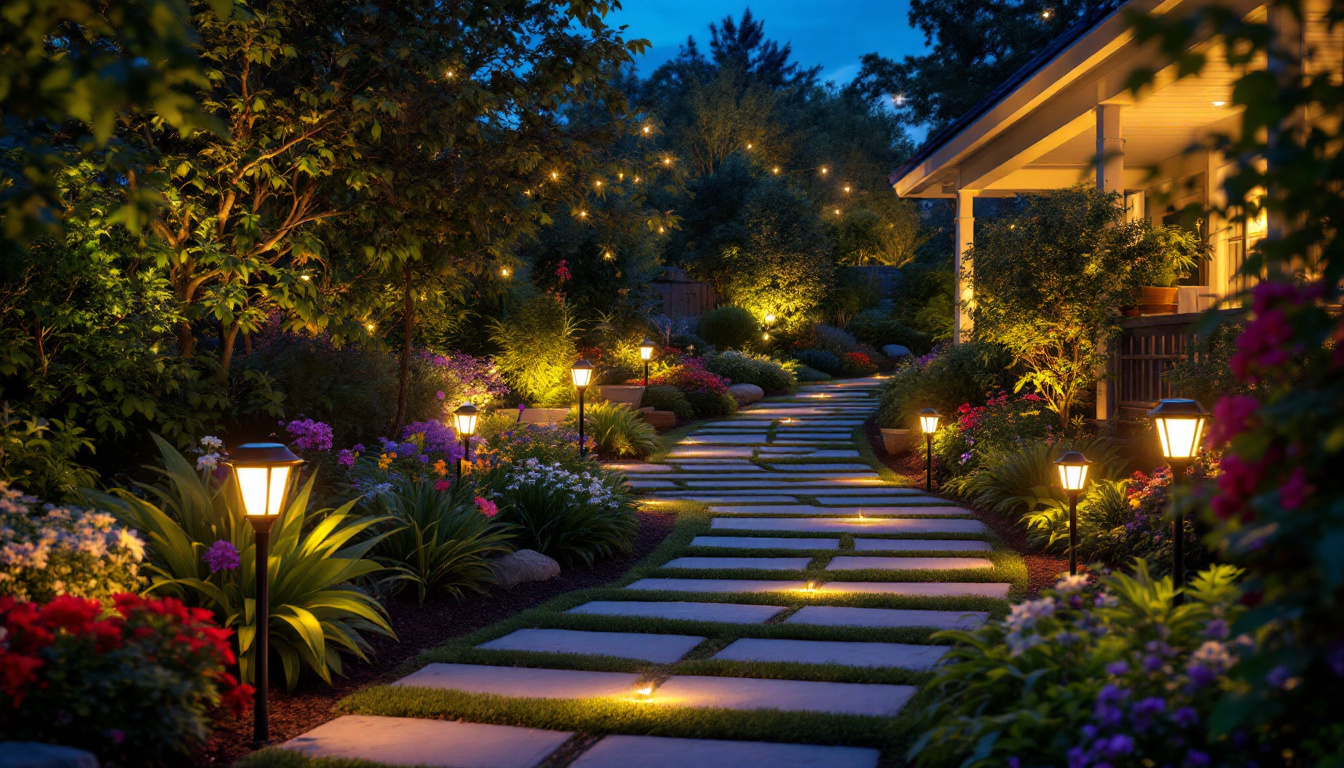
Lighting contractors play a crucial role in enhancing outdoor spaces, and solar garden lights have emerged as a popular choice for both residential and commercial projects. The growing trend towards sustainability and energy efficiency has made solar lighting an essential component of modern outdoor design. This article delves into the essentials of outdoor garden lights solar, providing valuable insights for lighting contractors looking to expand their offerings and meet client demands.
Solar garden lights harness the power of the sun, converting sunlight into electricity through photovoltaic cells. This technology allows for easy installation and minimal maintenance, making solar lights an attractive option for many clients. They are available in various styles, sizes, and functionalities, catering to diverse aesthetic preferences and practical needs. As homeowners increasingly seek to enhance their outdoor spaces, solar garden lights provide an eco-friendly solution that not only beautifies but also adds functionality to gardens, patios, and pathways.
Typically, solar garden lights consist of several key components: the solar panel, battery, LED light, and fixture. The solar panel collects sunlight during the day, converting it into energy stored in the battery. When night falls, the battery powers the LED light, illuminating the garden or outdoor space. Understanding these components is vital for contractors, as it allows for informed discussions with clients about performance, longevity, and maintenance. Furthermore, advancements in technology have led to more efficient solar panels and batteries, which can significantly enhance the brightness and duration of light output, making it essential for contractors to stay updated on the latest innovations in solar lighting.
There are various types of solar garden lights available on the market, each designed for specific applications. Path lights are ideal for illuminating walkways, while spotlights can highlight features such as trees or sculptures. String lights create a festive atmosphere for gatherings, and wall-mounted lights provide security and visibility near entrances. Being familiar with these options enables contractors to recommend the best solutions for their clients’ needs. Additionally, some solar lights come equipped with motion sensors, providing an extra layer of security by illuminating only when movement is detected, which can be particularly appealing for homeowners concerned about safety.
The advantages of solar garden lights are numerous. First and foremost, they reduce electricity costs, as they rely on renewable energy. Additionally, they are easy to install, requiring no wiring or electrical work, which can save time and labor costs for contractors. Moreover, solar lights contribute to environmental sustainability, aligning with the growing consumer preference for eco-friendly products. Beyond cost savings, solar garden lights also promote energy independence, as they do not rely on the grid, making them an excellent choice for remote areas or regions prone to power outages. The aesthetic appeal of solar lights, combined with their functionality, makes them a versatile choice for enhancing outdoor living spaces, allowing homeowners to enjoy their gardens well into the evening hours.
When installing solar garden lights, several factors must be taken into account to ensure optimal performance and longevity. Contractors should assess the location, angle, and exposure of the solar panels to maximize sunlight absorption. Proper placement is crucial, as shaded areas will significantly reduce the lights’ efficiency.
Conducting a thorough site assessment is essential before installation. Evaluate the landscape to identify areas that receive adequate sunlight throughout the day. Additionally, consider the overall design and functionality of the space. For instance, if the goal is to illuminate a pathway, ensure that the lights are spaced evenly to provide consistent lighting.
Weather conditions can impact the performance of solar garden lights. In regions with frequent rain or snow, it is important to select fixtures designed to withstand harsh weather. Contractors should also inform clients about the potential need for seasonal maintenance, such as cleaning solar panels to ensure optimal performance.
Proper installation techniques can significantly affect the performance of solar garden lights. For instance, securing the lights firmly in the ground is essential to prevent them from being knocked over by wind or foot traffic. Additionally, contractors should ensure that the solar panels are angled correctly to capture maximum sunlight, which may involve adjusting the height or tilt of the fixtures.
While solar garden lights are relatively low-maintenance, some care is necessary to keep them functioning optimally. Educating clients about maintenance can enhance their satisfaction and prolong the lifespan of the lights.
One of the simplest yet most effective maintenance tasks is regular cleaning of the solar panels. Dust, dirt, and debris can accumulate on the surface, obstructing sunlight and reducing efficiency. Contractors should recommend that clients clean the panels periodically, especially after storms or high winds.
Over time, the batteries in solar garden lights may lose their ability to hold a charge. Educating clients about the signs of battery failure, such as dimming lights or lights that do not turn on at night, can prompt timely replacements. Most solar lights use rechargeable batteries, which can be easily replaced without professional assistance.
Contractors should be prepared to address common issues that clients may encounter with solar garden lights. For example, if lights are not turning on, it may be due to inadequate sunlight exposure or a faulty battery. Providing troubleshooting tips can empower clients to resolve minor issues independently, enhancing their overall experience with solar lighting.
Incorporating solar garden lights into outdoor designs requires a thoughtful approach. Lighting contractors must consider aesthetics, functionality, and the overall ambiance of the space.
When selecting solar garden lights, it is essential to choose fixtures that complement the existing landscape and architecture. A cohesive design enhances the visual appeal of the outdoor space. For example, modern solar lights may suit contemporary homes, while traditional lantern-style fixtures may be more appropriate for classic designs.
Layering light is a key principle in outdoor lighting design. By combining different types of solar lights, contractors can create depth and interest in the landscape. For instance, path lights can guide visitors while spotlights highlight focal points, such as a garden statue or a beautiful tree. This layered approach not only improves visibility but also enhances the overall aesthetic of the space.
With advancements in technology, many solar garden lights now come equipped with smart features. These can include motion sensors, timers, and remote controls, allowing for greater control over lighting. Contractors should stay informed about these innovations, as they can offer clients enhanced convenience and energy efficiency.
Effective communication with clients is vital for the success of any lighting project. Educating clients about the benefits, installation, and maintenance of solar garden lights can lead to more informed decisions and greater satisfaction.
Contractors can enhance client education by providing informational resources, such as brochures or online guides. These materials can cover topics such as the benefits of solar lighting, installation tips, and maintenance advice. By empowering clients with knowledge, contractors can foster trust and confidence in their expertise.
It is important for contractors to set realistic expectations regarding the performance of solar garden lights. Factors such as geographic location, weather conditions, and installation quality can all impact performance. By discussing these variables upfront, contractors can prevent misunderstandings and ensure client satisfaction.
Encouraging client feedback is another way to enhance communication and improve services. After completing a project, contractors should follow up with clients to gauge their satisfaction and address any concerns. This proactive approach can lead to repeat business and referrals.
The solar lighting industry is continually evolving, with new technologies and trends emerging regularly. Staying informed about these developments can help lighting contractors remain competitive and meet client demands effectively.
As the demand for renewable energy solutions grows, integrating solar garden lights with other renewable systems, such as solar panels for homes, is becoming more common. Contractors should explore opportunities to offer comprehensive solutions that include both solar lighting and energy generation, providing clients with a holistic approach to sustainability.
Manufacturers are increasingly focusing on aesthetics and customization options for solar garden lights. This trend allows contractors to offer clients a wider variety of styles and finishes, ensuring that the lighting solutions align with their personal tastes and outdoor designs. Staying abreast of these options can enhance the contractor’s ability to meet diverse client needs.
The rise of smart technology in outdoor lighting is another trend to watch. Features such as app control, integration with home automation systems, and adaptive lighting capabilities are becoming more prevalent. Contractors who embrace these innovations can provide clients with cutting-edge solutions that enhance convenience and energy efficiency.
Outdoor garden lights solar represent a significant opportunity for lighting contractors to expand their services and meet the growing demand for sustainable lighting solutions. By understanding the components, installation considerations, maintenance needs, and design principles associated with solar lighting, contractors can offer valuable expertise to their clients.
As the industry continues to evolve, staying informed about trends and advancements will be essential for success. By prioritizing client education and communication, contractors can build lasting relationships and enhance their reputation in the market. Embracing solar garden lights not only contributes to environmental sustainability but also positions contractors as leaders in the modern lighting landscape.
Ready to elevate your outdoor lighting projects with solar garden lights that promise quality, affordability, and environmental sustainability? Look no further than LumenWholesale. Our extensive selection of spec-grade lighting products is designed to meet the highest industry standards, ensuring that you deliver reliable and high-performance lighting to every client. Say goodbye to inflated markups and hello to unbeatable wholesale prices, with the added convenience of free shipping on bulk orders. Don’t compromise on quality or value—choose LumenWholesale for your lighting needs and experience the perfect blend of quality, affordability, and convenience. Visit us now at Wholesale Lighting at the Best Value and start transforming your outdoor spaces today.

Discover essential tips and common pitfalls to avoid when installing Leviton motion sensor switches.

Discover how elegant wall sconces can elevate your lighting projects and boost profits.

Discover essential insights and expert advice tailored for lighting contractors in this comprehensive guide.

Discover the transformative advantages of post lantern solar lighting for contractors.